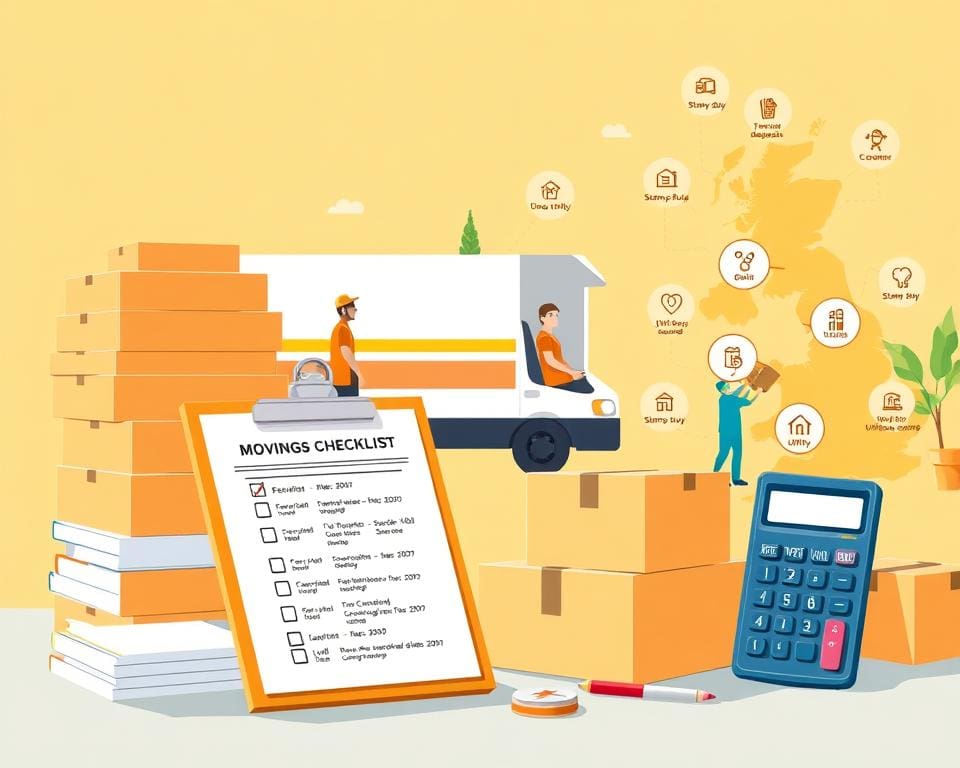Relocating can be an exhilarating yet daunting journey, especially when you consider the costs involved. Understanding how much it costs to move house in the UK is essential for effective budgeting and planning. From removal fees to packing materials, the moving house costs UK can vary widely based on various factors, including distance, size of the property, and the timing of your move. Recent data from the UK Office for National Statistics indicates a significant range in the cost of moving house in the UK, making it imperative to gather insights and prepare adequately for this transition. Planning ahead not only eases the process but also helps mitigate any unexpected expenses along the way.
Understanding the Components of Moving House Costs
Moving house can often feel overwhelming, especially when considering the various components of moving house costs that can accumulate. A well-planned house moving budget in the UK is crucial to ensure financial stability during this transition.
The initial expenses typically include valuation surveys and legal fees, which can add significant amounts to your overall budget. These factors might often be overlooked, leading to unanticipated house moving expenses in the United Kingdom.
As the moving date approaches, variable costs such as packing supplies, transportation, and insurance may arise. Without adequate planning, these incidental charges can contribute to a ballooning budget. Understanding the full range of components of moving house costs can make financial management more straightforward.
By recognising all potential expenses, you are better equipped to stay within your house moving budget in the UK and avoid unnecessary stress during what can already be a hectic experience. Approach your move with knowledge and confidence, allowing you to face the challenges ahead.

How Much Does It Cost To Move House In The UK
Determining the costs associated with moving house in the UK requires understanding both the average expenses and the various elements influencing those expenses. Relocating can be a significant financial undertaking, yet grasping these aspects can help homeowners plan their budgets more effectively.
Average Costs Involved
The average costs of moving house in the UK range significantly, with typical estimates falling between £1,000 and £2,000. This average encompasses a variety of services typically provided, including removal services, packing, and transportation. Each move is unique, so reflecting on UK house moving prices can provide helpful insights into what to expect.
Factors Influencing Moving Costs
Several factors influence moving house costs in the UK. The distance of the move plays a crucial role, with longer journeys generally leading to higher charges. The size of the home also impacts pricing; larger houses require more time and resources for packing and transportation. The time of year matters too, as peak seasons often see elevated costs. Additional services such as packing assistance or storage solutions can further alter the final price. Understanding these factors influencing moving house costs can aid in making informed and effective budgeting decisions.
House Moving Expenses in the United Kingdom
Understanding the financial aspects of moving is crucial for anyone planning to relocate in the UK. This section explores the different house moving charges in England, focusing on the common expenses involved with both removal companies and self-moving scenarios.
Removal Company Charges
Hiring a removal company often entails various house moving charges in England. These typically depend on factors such as the volume of belongings, distance to the new location, and any additional services required. Many professional movers offer flexible packages, which may include packing, unpacking, and even storage solutions. While the costs can be daunting, the convenience and peace of mind provided by professional assistance can greatly outweigh the price tag.
Self-Moving vs. Professional Movers
The debate surrounding self-moving vs. professional movers is common among those planning a move. Opting for self-moving can lead to significant savings, as individuals can avoid removal company charges entirely. However, this method may introduce hidden costs like van rental, fuel, and the considerable investment of time to complete the move. Weighing these aspects is essential for anyone contemplating how they will manage their relocation while ensuring it aligns with their budget.
Relocating Home Fees in Great Britain
Relocating can come with a plethora of fees that might not be immediately apparent. In Great Britain, various charges can significantly impact overall moving house costs UK. Factors such as location and type of property can lead to substantial differences in the price of house relocation in UK. For instance, urban areas often demand higher fees compared to rural regions, making it essential to assess the specifics related to your move.
Some common relocating home fees in Great Britain include:
- Land registry fees, which are necessary for updating ownership records
- Stamp duty, applied during property purchases and dependent on the property price
- Connection fees for utilities, which can sometimes include service installation charges
According to reports, local authorities may levy varying rates for these costs, leading to differing totals even within the same region. Understanding these fees can help you budget effectively, ensuring that your relocation process remains smooth and less financially daunting.
Additional Costs You Might Not Consider
When planning a move, many individuals focus primarily on large expenses such as removal company charges and transportation fees. Yet, additional moving costs can significantly affect the overall budget if overlooked. Staying informed about these often-underestimated expenses can help avoid financial surprises on moving day.
Packing Supplies and Materials
One of the common yet frequently neglected costs involves packing supplies UK. Boxes, bubble wrap, packing tape, and other materials may seem inexpensive at first glance, but these expenses can accumulate quickly. It is wise to budget for all the necessary supplies, ensuring that every item is properly protected during the transition. Taking time to source affordable alternatives or even repurposing items for packing can mitigate some of this financial strain.
Insurance and Liability Costs
Another important aspect to consider involves insurance and liability costs. Protecting your belongings during transport is crucial, as damages can occur unexpectedly. Moving companies often offer insurance options, which can range from economical to expensive based on the value of your possessions. Investing in a policy that adequately covers your items provides peace of mind and protects you from potential financial loss.
Budgeting for Your Move
Getting organised with a moving house budget in the UK is essential for a successful relocation. Effective budgeting for a house move can help ensure that you allocate the right amounts to each category of expenses. A clear financial plan enables you to track where your money goes, preparing you for any unexpected moving costs that may arise during the process.
Creating a Moving Budget Plan
To create a solid moving budget, start by estimating key expenses such as removal company fees, transportation, and packing supplies. Listing all anticipated costs can serve as a roadmap for your budgeting efforts. Here are some critical components to include:
- Removal company fees
- Packing materials
- Travel expenses
- Insurance and liability coverage
- Cleaning and repairs
Setting aside an additional buffer of around 15%-20% of your projected costs is prudent. This buffer acts as protection against unforeseen circumstances that may emerge, ensuring you maintain financial peace of mind throughout the moving journey.
Unexpected Expenses to Watch Out For
While budgeting helps mitigate financial surprises, unexpected moving costs can still creep in. Be prepared for potential scenarios such as:
- Last-minute repairs to your home
- Changes in moving dates leading to additional fees
- Higher charges during peak moving season
- Hidden costs related to utilities or postal redirection
Anticipating these possibilities can reinforce your strategy in managing the costs related to your upcoming move. Keeping an adaptable approach will allow you to navigate the process with greater ease and confidence.
Tips for Managing Moving Costs
When planning your move, implementing effective strategies can significantly assist in managing house relocation expenses. One of the top tips for managing moving costs is to obtain multiple quotes from various removal companies. This approach allows you to compare services and prices, ensuring that you choose a reputable company that fits your budget.
Another insightful cost-saving moving tip involves utilising local community groups or social media platforms to find packing supplies. Many individuals have leftover boxes and materials from their own recent moves, often available at little to no cost. Moreover, consider timing your move during off-peak seasons. Moving in periods when demand is lower can lead to substantial savings on removal fees.
Prior to your move, take the time to declutter your belongings. This not only simplifies packing but also reduces the overall weight of your move, directly impacting costs. By engaging in meticulous planning and execution of these tips for managing moving costs, you can enjoy a smoother and more economical transition to your new home.









